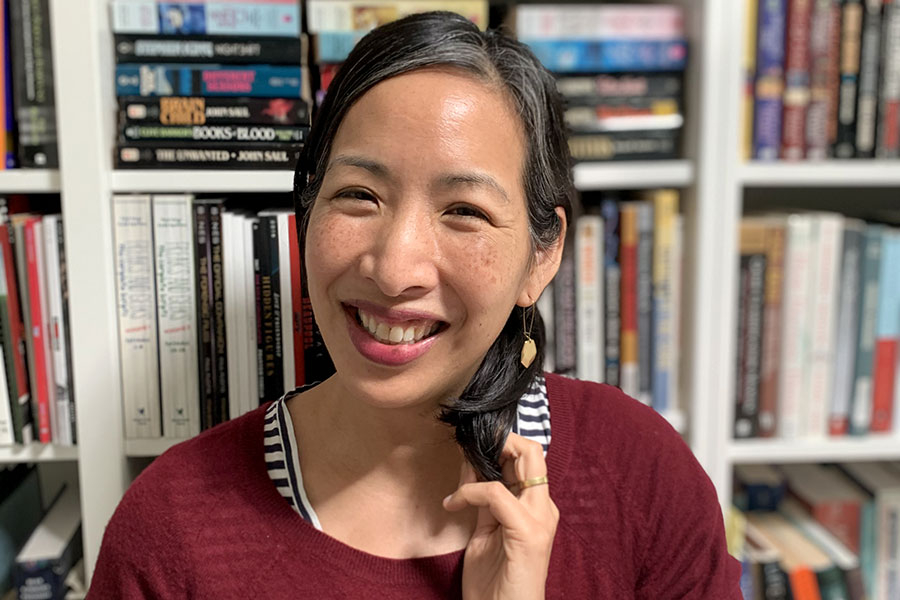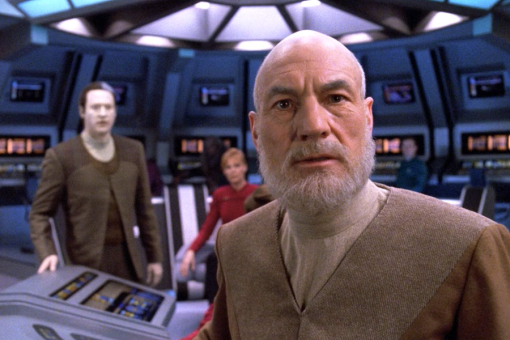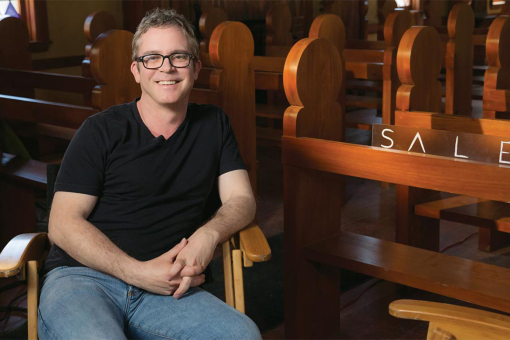Television Academy Foundation alumna Janet Lin is a seasoned television showrunner and writer who, in 2020, served as a co-executive producer and writer on season one of the Netflix juggernaut period drama Bridgerton, produced by Shondaland. With an astounding viewership of 82 million households, Bridgerton has become the most-watched series ever on Netflix to date.
In her impressive career, Lin has amassed an extensive and notable list of credits—with no signs of stopping. From 2018-2019 she served as co-executive producer of the Emmy-nominated science fiction comedy-drama series The Orville for FOX, where she worked alongside another Television Academy Foundation alumnus, Executive Producer Brannon Braga, a 1990 TV scriptwriting intern.
In 2016 Lin was co-executive producer of NBC's medical comedy-drama The Night Shift. She served as a producer on the ABC series Forever in 2015, and from 2007-2012 she was a producer and writer on the FOX series Bones.
Fresh off of Netflix's 2020 Bridgerton and Cursed series, Lin is currently in development and writing a yet-to-be-named Disney animated feature film.
Brimming with talent, creativity and passion for new projects on the horizon, Lin's forged a successful, barrier-breaking television career as an Asian American woman. Her professional journey began in 2005 as a Television Academy Foundation TV scriptwriting intern after completing her MFA in screenwriting at the USC Film School.
How did your Television Academy Foundation internship (in 2005) help you on your career journey?
I feel like I owe a lot of my career to the Television Academy Foundation. I do. I came in right after (graduate) school in the fall of 2005, and getting the internship really kind of legitimized me because getting in was so prestigious. After the internship, I was accepted into the CBS Diversity Institute Writers Mentoring Program. Back then for people of color that was the only way in. So it kind of legitimized me to be able to move into television writing.
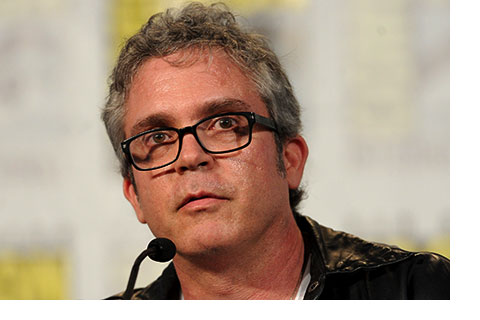 Where did you intern?
Where did you intern?
I worked as an assistant on a show called Threshold (a 2005 science fiction drama series starring Carla Gugino and Peter Dinklage) for CBS with showrunner Brannon Braga (pictured) who was a Television Academy Foundation TV scriptwriting intern 15 years before me. And then randomly—actually a few jobs ago—I was working on The Orville, Seth McFarland's show; and Brannon was on the show, too. It was so weird to be a peer of his when I had been his intern 10 years before. It was fun. He's great, he's fantastic.
I learned so much during the internship. It taught me what a writers' room was and what it was like to be on a show production.
Would you recommend the Television Academy Foundation's Internship Program to students who aspire to be TV writers?
I would absolutely recommend the (Television Academy Foundation) Internship Program. I was literally given access to the people that I wanted to be, placed in the (writers') room where I wanted to end up. When my internship ended, I was promoted to writers' assistant on the CBS show where I had interned. And some of the baby writers took me under their wing, reading my scripts and introducing me to representation. Hollywood is about proximity and relationships. I ended up with both through this program.
After that, I got an agent and went directly into being a writer on a show called Waterfront. It was another CBS show starring Joey Pants (Joe Pantoliano) as lead. And that one actually never aired. It was like "I finally made it!" and it never even aired. I think we shot five episodes, and it got shut down. And then after that, I landed on Bones. I was there for five years, and that's when I really settled in and learned the business. It was like a family. That was when the really good shows were coming out like Everwood, The Sopranos and Veronica Mars first season.
So you were employed as a television writer by 2006, just one year out of graduate school? Weren't you terrified?
I was too stupid to be terrified probably (laughs). And also, don't you think when you meet writers, as a writer yourself, there's a nerd kinship somehow? It's like "I know you." No matter how high level or low level you are, you're all the same breed. You're all the same kind of person, all sort of nerdy, all sort of weird. I feel when I worked for Brannon as an intern and then when I was a co-EP on set shows with him, it's the same vibe. He's still the same guy ... still the same nerdy, weird oddball just like me.
Let's talk about the fact that in 2005/2006 you were an Asian woman trying to make your way in the entertainment business. Do you feel you experienced sexism and/or racism in your career journey?
Definitely. I definitely think there's a default for, or maybe not anymore, but there was always a default for white men as leaders. For me, it's a double whammy with being a woman and being an Asian woman. I just don't think executives back then, or even showrunners back then, would think of you as a leader-- someone who could run a (writers') room. And that's hard to get out from under, I think.
Especially early on in network TV. It's not like anyone actively says, "We don't like women. We don't care what you women have to say. We don't care what an Asian woman would have to say." It's just that the people who matter in the (writers') room are the people the showrunners feel most comfortable with. And those people get consulted for things, the people who get pulled into the room and get asked, "Hey, can you help me break this (story)?" Or "Hey, do you mind writing this for me?" They're buddies. They're the white-guy buddy factory you know? So it's never "No, we don't want to hear you." It's just you're never invited in; and I found that true in most of my early jobs, and now it's not like that at all. A lot of the staffs I've worked on (in recent years) have been mostly female, and it's been great. Just wonderful.
I think it's really changed. I think the biggest change has been when the executives changed. When the people who are hiring, or the people who are buying are women, women of color, people of all sorts. I think that's been the change because they want to hear other stories. They're open to bringing on a showrunner that has a different kind of life or experience.
It's also important to find a mentor, to find someone who can help you, to find someone who will champion you. Often people want to champion people like themselves. So early on, it was hard; it was hard to find that person who would champion you. Now I reach out to Asian women all the time; and I say, "Please let me help you."
Are you personally involved in any programs focused on increasing diversity in the field?
Yes, in fact today I have a call with a mentee from #Startwith8Hollywood. It hooks up eight women of color with a mentor, and I asked to help Asian American women specifically. And they immediately gave me eight. I was like holy moley—there is just such a need!
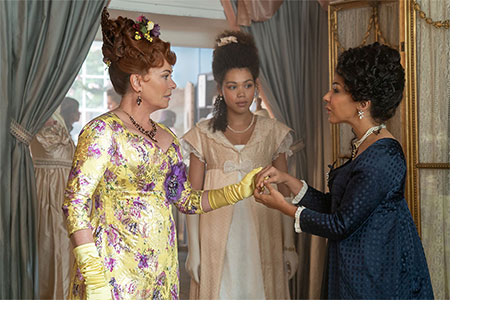 What was it like working on season one of Bridgerton?
What was it like working on season one of Bridgerton?
The writers from Season 1 are amazing! Shondaland has a different way of doing things, and it's interesting to have an empress (Shonda Rhimes) at the top of the empire. The writing really reflected the fact that our writers were mostly female and we had several women of color on staff. I think there was only one guy—who's delightful—(Co-EP) Jonathan Igla and our showrunner (Chris Van Dusen). I'll be honest and say that it was a tough job and we rewrote and rewrote and rewrote, but I'm delighted at how graceful and light the actors made our hard-fought words. It was an experience!
You have worked on various types of TV shows from drama, comedy, fantasy, period romance, etc. Is there a particular genre that is your favorite?
Really depends on the day. But I would say that I gravitate toward grounded sci fi and heightened worlds.
When did you know you wanted to be a writer?
I knew when I was 6 or 7 (years old). I told everyone that I was going to be an author. That's when my mom started the campaign to be like, "No, you're going to be a doctor and a writer on the side ... or, "a lawyer and a writer on the side." I was a big reader, and I was like, this is amazing! Even now, today, as a paid writer, I still am gleeful when I realize that I'm being paid to do this. I will do this for free. Don't tell anyone (laughs), but I would do this for free.
Tell me about your background, where were you born and raised?
I'm Taiwanese American. I was born in the states, but my parents are from Taiwan. They came to America when they were in their 20s to go to school. I was born in the San Francisco area, Berkeley actually, and raised in Orange County (California).
I went to Amherst College (in Amherst, Massachusetts) for undergrad. I was an English lit major because creative writing "would not have been responsible." I was an English fine arts major. My parents were like, "You're useless. Why did we send you to the East Coast?"
I grew up in California, moved out east for college and then moved to New York (City) and lived there for about five years. I came back (to California) because of 9/11. I was doing internet advertising back then. Pharmaceutical advertising, as a child of Taiwanese parents, you need to actually have a real job ... like a practical job. At the time I was writing for Viagra. (laughs)
Sitting around a boardroom table, guys telling d**k jokes all day long. I was the only woman, and it was horrible. So after 9/11, New York went through a recession. Everyone lost their jobs. Particularly in advertising. So I was like I could just roll into another job; or, I'm 26, I could write the great American novel because I am so ready. I have so many stories to tell. So I wrote a novel titled "The Black Triangle." I took two months, collected unemployment, wrote the great American novel and it ended up being this trashy teen novel. But it ended up getting pulled out of the slush pile at Penguin Putnam; and I was like, "Oh, maybe I can do this for a living."
It ended up not being published. So if you go looking for it, you're never going to find it. But it got pulled out of a slush pile—again legitimacy. I had an editor, and I was doing a rewrite and thought, "I can do this." "I can write for a living." Maybe I can make this work. And my grandpa in Taiwan, my father's father, is actually a really famous Taiwanese director.
Really?
Yeah. He was a very stand-up one. His name was Lin Tuanqiu.* He won the Taipei Golden Horse Film Award, the lifetime achievement award. If you study film in Taiwan, you would study his films. He was one of the early pioneers in Taiwanese filmmaking.
But in our family—and every other Asian family—my parents were like, "If you want to be a screenwriter, that might be okay, But you need to go back to school if you want to start a new career." And so I ended up coming back to LA to go to USC.
With so much content needed now for broadcast outlets and streaming services, how do you think the business has changed? As a seasoned showrunner and writer, are you offered more work than you can handle?
Yes, there's so much IP (intellectual property) out there. People are always generating stuff, and there aren't enough high-level writers—people who have the experience. Particularly because they send the showrunner away on location for a long time. I actually came up during the time when writers went to set and learned how to be on set and how to do post (production). Whereas, the young writers now that are already pretty high level, some of them don't have any of that experience. It's going to be really hard for them to run shows. There's a whole generation, a younger generation, of high-level writers who've never been on set, never dealt with an actor and never done post.
It's going to squeeze the people who are coming up, they don't have the experience to run a show. And that's a problem. There's just a huge gap in knowledge that's not being passed on. I just had one of my mentees who was saying they were on a 22 episode series where they were doing post, going to set, and producing their own episode; and they said to me, "I'm not happy on this network show." But I was like, "You're getting all that experience. Just stay for a couple years. Get that experience then move on. Because no one else is going to have that experience."
I think it's still hard for baby writers to break in. It's getting harder and harder because everyone wants smaller (writers') rooms, and in the smaller rooms people want experience generally.
What advice would you give to aspiring students interested in writing for television?
Just do it. There's nothing more frustrating than speaking to someone who wants to be a writer who isn't actively writing. If you're serious, write at least a couple of scripts a year, whether paid or unpaid. Find what you're passionate about and just do it! No excuses.
What are your future goals?
I told my agent recently I want to walk onto my own set. That's the most important thing. I want to be on my own set of a project that I've created. I feel you're never too old to do it for yourself. Some people get to the point where they're like, "I only write to get paid"; and I say, "Come on guys, that's ridiculous. You write because you want to. You have a story you want to tell. It's because you love it."
As a working mother with two, pre-teen sons at home, how has the COVID-19 pandemic affected your work life?
I would say now with the pandemic and doing development, it's not that dissimilar (from working on a series). I'm in my room on my computer, and the kids are around. We're really privileged as writers. You don't need any extra equipment, you don't need any extra stuff, you just need time and your own mind.
We really enjoy our time with the kids. Everyone's good. We're just super boring. It's just a tedious life. Just push through until the vaccine comes.
The COVID-19 pandemic and the anti-China rhetoric surrounding it have given rise to increased hate crimes, harassment and slurs targeting Asian Americans, how does this make you feel?
We're all sisters and brothers. It's terrifying and it's unfortunate, and it's so clearly tied to our former leadership (Trump administration). It just makes me furious and makes me sad.
* Born in 1920, Lin Tuanqiu was a Taiwanese playwright, theater and film director, and a producer. In 1957 he created the Hushan Film Studio and Yufeng Film Company. He studied in Tokyo, Japan, where he worked at Toho Studios. Between 1959 and 1965, Tuanqiu directed six feature films. Recently, the Taiwan Film Institute restored some of them and unveiled them to the world. He died in 1998 at age 77. [article: An Introduction to a Taiyupian Filmmaker, Lin Tuanqiu]

